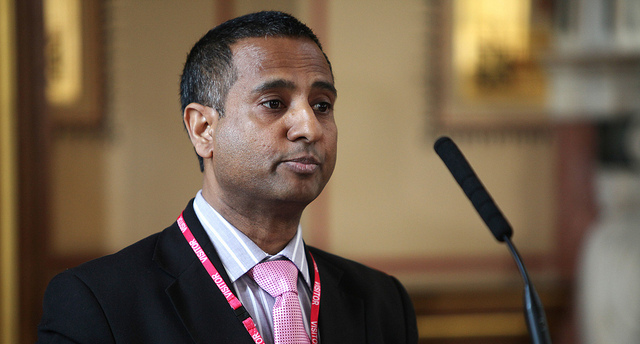by Derek Davison
The case of the now-convicted Washington Post reporter Jason Rezaian, covered in detail by Ali Gharib in this space last week, is only the most glaring example supporting the idea that the human rights situation in Iran has gotten worse rather than better after the conclusion of the nuclear deal. But there are many other examples. In the past week, two Iranian poets, Fatemeh Ekhtesari and Mehdi Musavi, were sentenced to 99 lashes and about a decade in prison for the crime of “kissing and shaking hands with unrelated members of the opposite sex.” Iranian filmmaker Keywan Karimi was sentenced to six years in prison and 223 lashes for what Karimi called “insulting sanctities,” but there was no clarification as to what that actually means.
Of course, no discussion of Iran’s human rights record would be complete without mentioning the ongoing saga of the two leaders of the 2009 “Green Movement,” Mir-Hossein Mousavi and Mehdi Karroubi. Both men have been under house arrest for over five years without having been convicted of any crimes, and their situation continues to be a flashpoint for tensions between Iran’s hardline and reform parties.
Extended prison sentences and lashings for benign or downright inscrutable crimes is only part of the problem. Consider, for example, Iran’s shocking capital punishment record. Iran may execute over 1,000 convicts this year, a number that would dwarf the 753 reportedly executed there last year. Iran routinely executes people for crimes committed as juveniles, as in the cases of Fatemeh Salbehi and Samad Zahabi, executed over the past two weeks for crimes committed when they were 16 and 17 years old, respectively. Iran executes more people per year than any country apart from China (whose execution statistics are unknown). On a per-capita basis, Iran is easily the world’s leading executioner. Startling on their own, these figures are downright chilling when coupled with what we know about the arbitrary nature of the Iranian justice system, which has been clearly illustrated by the Rezaian case.
In the longer term, Iran’s human-rights situation may well improve as a result of the nuclear deal, with the lifting of sanctions and the transformation of Iran’s economic and political environment. But the struggle to improve human rights in Iran has become a short-term casualty of the deal. Elections are approaching next year for the Iranian parliament and the Assembly of Experts, the scholarly body that will be responsible for selecting the 76-year-old Ayatollah Ali Khamenei’s successor as Supreme Leader. So, the political stakes for both reformers (energized by the completion of the nuclear deal) and hardliners (who largely opposed the nuclear talks) are high, and hardliners are warning the Iranian people of the potential for international meddling in Iranian affairs. For example, Ahmad Jannati, a leading hardline cleric and the chairman of Iran’s Guardian Council (the body that advises the Supreme Leader on religious matters), cautioned in a sermon on Friday that the nuclear deal could lead to international demands that Iran change its penal code, recognize equality between the sexes, and permit same-sex marriage.
Despite the warnings of Iranian hardliners about inevitable Western demands on Iranian society, the United States and the international community have little leverage to promote change inside Iran. Speaking at an event sponsored by the Project on Middle East Democracy (POMED) last week, Brookings Institution Senior Fellow Suzanne Maloney described herself as “a huge cynic” about what US action can accomplish in this area. “Ultimately, we have relatively few tools with which to work,” she said. It took nearly a full decade for Washington to lay the foundation for engaging Iran on the nuclear issue, she pointed out, and a comparable international consensus simply does not exist around the issue of human rights.
This is not to say that the rest of the world is powerless when it comes to trying to curb Iran’s human rights violations. Another participant in POMED’s human rights event, Freedom House’s Senior Program Manager Dokhi Fassihian, argued that strong international monitoring can help build the kind of international consensus that could then lead to increased pressure on the Iranian religious political establishment to improve its record. Also possible are concrete actions, like sanctions against the worst Iranian human rights abusers in the judiciary and the government. She suggested that a UN commission of inquiry could be formed, along the lines of similar efforts in Eritrea and North Korea, to build on the work being done by Ahmed Shaheed, the UN’s Special Rapporteur on the Situation of Human Rights in the Islamic Republic of Iran. She cautioned against adopting an attitude of complacency now that the nuclear deal has been completed. The UN stopped monitoring Iran’s human rights situation in 1997 upon the election of the reformist Mohammad Khatami as president, she noted, and that proved to be a mistake when Khatami’s reform efforts failed.
Still, any action the US takes with respect to Iran’s human rights situation must be tempered by the understanding that it could produce a backlash in Iran and actually weaken the reform movement there in the short term. In this interim period between the conclusion of the nuclear deal and the upcoming elections, the most important thing that the US and the international community can do for human rights in Iran may simply be to keep paying attention.
Photo: UN Special Rapporteur Ahmed Shaheed






Would take exception to the view that Iran is easily the world’s biggest executioner on a per capita basis. North Korea is presumably way ahead.
How can we lecture Iran on Han rights when our own legal experts say the Geneva Conventions are “quaint”?
Ahmed Shaheed prepares his reports on Iran based on what he gets from MEK and jewish state so he is not trust able.
“…any action the US takes with respect to Iran’s human rights situation must be tempered…” by the possibility that Iran might demand attention to the US’ past and present record on human rights.